The Mespotamia Magistrate’s Court, on Monday, ruled against the defence in the trial of government senator Ashelle Morgan and Karim Nelson, an assistant director of public prosecution, and allowed evidence about calls that the senator allegedly made to the wife of the virtual complainant, Cornelius John, on April 13, the day that he was shot at his home.
“In absence of authority directing me to omit evidence of Mrs John, I will proceed. If I am wrong, there are other other means of redress,” Magistrate Bertie Pompey ruled in the trial, which is taking place at Calliaqua.
Before the ruling, the defence and the prosecution renewed the arguments which they had made to the court on Friday.
Defence counsel, Ronald Marks had made the application that the court wipe Nicole John’s testimony from the record.
Mrs John took the stand on Friday, Day 3 of the trial, in which Nelson stands accused of wounding John, 63, of Diamond, by shooting him in the left leg, and unlawfully discharging a firearm at him.
Morgan, a lawyer, is accused of assaulting John.
The offences were allegedly committed on April 13, at Diamond, the same date and place that Mr. John is alleged to have used threatening language to Morgan — for which he is to be tried.
Mrs. John took the stand at 9:13 a.m.Friday, and, like all of the other witnesses, was affirmed.
iWitness News is delaying its reportage of the actual evidence in the case in keeping with an order by the presiding magistrate, after the prosecutor, S. Stephen Brette, complained about the detailed nature of our initial reports from Day 1 of the trial.
Mrs. John told the court about her interactions with Morgan, their activities on April 13, and phone calls that she had with Morgan on that day.
The witness was about to tell the court about what allegedly occurred on April 14 when Counsel Ronald “Ronnie” Marks, who is representing Nelson, rose.
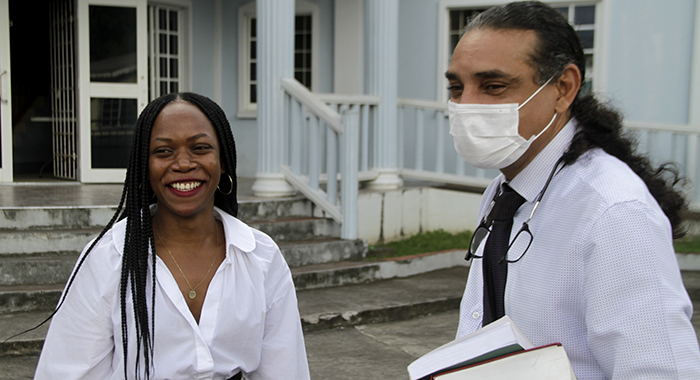
Marks told Magistrate Bertie Pompey, who is presiding, that the evidence that was being led had not been disclosed to the defence.
“All of it is new evidence,” he told the court, noting that there has been additional disclosure up to that (Friday) morning.
“What is happening now is the classic example of trial by ambush,” Marks said.
But Brette — who is deputy director of public prosecution in St. Lucia and has been retained to prosecute the matter — told the court that if the defence is claiming trial by ambush, the Crown had been on the receiving end the previous day.
At this point, 10:33 a.m., the court asked the witness to leave the courtroom while legal arguments were entertained.
“This cannot be a tit for tat. I don’t believe that is what the prosecutor is saying,” said Duane Daniel, who is representing Nelson.
Daniel said that in St. Vincent and the Grenadines, a defendant is entitled to reserve his defence. He said that the defendant has a right to disclose to the prosecution in the special instance where alibi is to be used as a defence.
“The only other time is when you are challenging a confession. That is it in this jurisdiction,” Daniel said.
“So for the prosecutor to indicate that the defence was by ambush is categorically incorrect and if, Your Honour, it is his position that he was ambushed and, therefore, he is going to lead material which is material to the case that was not disclosed, especially since this morning in relation to another witness that has not been called, we received disclosure from another witness, speaks of prosecutorial ambush.”
However, the prosecutor contended that Mrs. John had testified that Morgan called her on a number of occasions and there were conversations between them.
Marks, however, stood and said that nothing disclosed in the file speaks to telephone conversation that allegedly took place after.
The prosecutor asked to be allowed to finish. He said that Morgan provided the police with phone records which indicated that calls were made from her phone to Mrs. John’s phone and the duration and times of the call.
“That was disclosed to my learned friend,” Brette said.
Daniel, however, said that his client has to defend what the prosecution was bringing.
“It was one thing to say there were conversations but if the prosecution is bringing information to her prejudice, they have to disclose it.”
The magistrate noted to the prosecutor that Morgan and Nelson are the defendants in the case.
“There is a consequence if they are found guilty. There is none for witnesses. The document from the previous day cannot be said to have been forced by ambush because it is a document that the witness signed,” Pompey said.
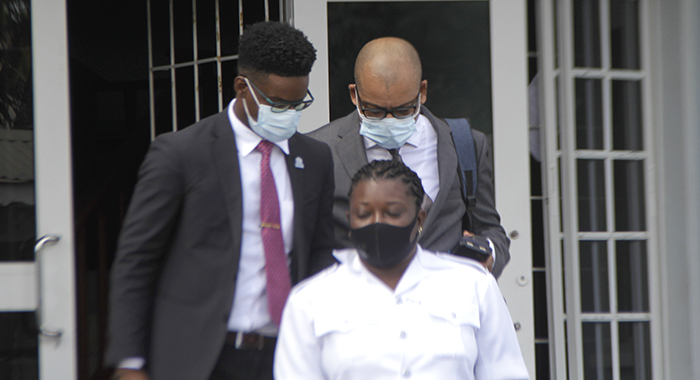
But Brette noted that when the defence presented the document to the court, Mr. John had said that he had never seen it before.
“And he signed it? It is a document made by him,” Pompey said.
The prosecutor, however, said that they had gone past that and the magistrate said that it was the prosecutor who had brought up the issue.
Marks then made a formal application that all of that testimony relating to the alleged phone calls between Morgan and Mrs. John be struck from the record “as it is unfair in the circumstances.
“I have never seen this approach to prosecution in all my life as a lawyer — 22 years. … it is definitely prejudicial”
The lawyer questioned how a defendant could prepare his case if information is not disclosed. “The Court of Appeal has spoken on this,” Marks said.
“What is the authority?” Brette asked.
“How was I to know you were going to conduct the case in such an unorthodox manner?” the defence counsel fired back.
The prosecutor maintained that Morgan had provided the police with phone records with the number of calls, times and duration.
“This cannot be an ambush because, according to the witness (Mrs John), the conversations were initiated by the defendant (Morgan). The defendant knows of all the conversations. She knew of the conversations she had with the witness,” Brette said.
“They provided a copy of the phone log. So there is no way it could be prejudicial. It is within the peculiar knowledge of the defendant.”
Daniel, however, argued that the defence having provided with the log was to indicate that there were conversations between the parties in relation to there being a threat.
He said that if the prosecution, on further investigation, thought that the log could be useful to the case, the prosecution was to have taken a further statement.
“That evidence ought to have been disclosed during the course of the trial.” Daniel said.
“To say there were telephone calls and of duration is one thing but to put the content of those conversations as a plank of your case and not disclose it is misconduct.”
The magistrate said that he agreed with Marks, adding that the lawyer should cite the authority.
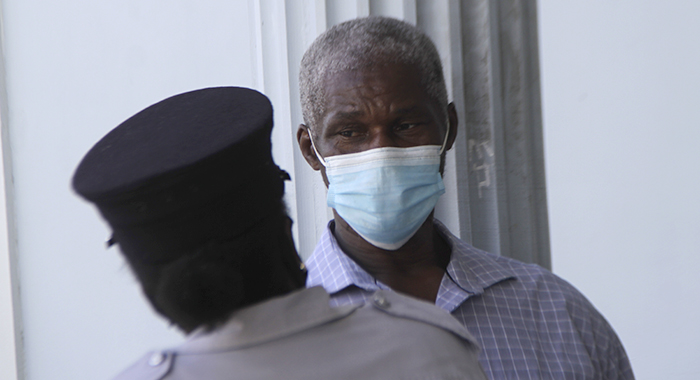
The prosecution said that the remedy was for the matter to be stood down to effect disclosure to the defence.
“It cannot be prejudicial to the defence because they are the one who make the conversation. The remedy is for an adjournment. The court can’t rule on bare assertion,” Brette reasons.
However, Marks maintained that the prosecution had disclosed to the defendant that there was a phone call made but did not disclose the content.
“It is a ludicrous argument! How unfair could that be and to not disclose this material evidence is misconduct!”
At this point, Kay Bacchus-Baptiste, who has a watching brief in the matter and is Mr. John’s counsel in the threatening language charge against him, asked to be allowed to rise amicus.
She said that the prosecution “may have a point regarding whether there may be disclosure.
“The reason why I say ‘may’ is that the prosecution said there was disclosure. Be that as it may be, the remedy cannot be to strike it. Disclosure is ongoing,” Bacchus-Baptiste told the court.
The magistrate asked for authority that evidence should be struck from the record.
He added that he could adjourn the matter but noted that Brette had said that he was in the country until that day (Friday).
SVG’s Director of Public Prosecution, Sejilla Mc Dowall had anticipated that the trial would have taken two days, and had set aside Wednesday to Friday, Nov. 10-12, with the last day being a “grace period”.
The prosecutor, however, told the magistrate that he is in the court’s hands.
Marks told the court that there are “certain consequences that I may explore” and the prosecution asked for an adjournment until 2 p.m.
Pompey asked if that was sufficient time and Daniel responded that he does not know the content of the material that was to be disclosed.
The magistrate suggested a tentative adjournment until 2 p.m.
Brette told the court that Morgan would not be prejudiced because the calls were made by her.
Daniel said that the call is “here is a bag” but what the prosecution is saying is “this is the content of the bag and you ought to know what is in the bag”.
The magistrate reminded the parties, “The question is delete or not to delete.”
He further noted that there are no photocopiers in the immediate vicinity and the closest one might be in Arnos Vale.
At 10:51 a.m., he adjourned the hearing until 2 p.m.
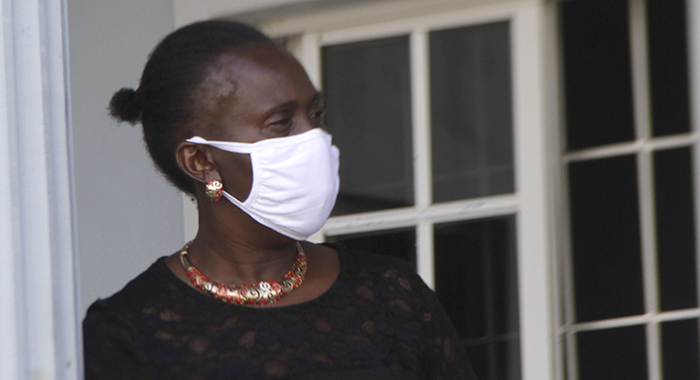
The trial resumed at 2:17 p.m. and Pompey said that the court was adjourned so that disclosure could be made.
But Brette rose and said he thought that the defence was going to present the court with the authority to support its application that Mrs. John’s testimony be deleted from the record.
But Marks rose and said that the hearing was adjourned so that disclosure could be effected so that the defendants could be made aware of the new material.
He said that the authorities make distinctions between fresh evidence and failure to disclose.
“This is not fresh evidence. It was in existence since the allegation,” Marks said, adding that the defence maintains that that was the case.
He further argued that the matter was adjourned for that purpose and the court knew this because that is how the magistrate led off after the resumption.
“It is 2:20 and the defence have not seen the statement that they (prosecution) are hoping to adduce into evidence,” he said, adding that the prosecution still had not disclosed.
“We are renewing the application that the court has discretion to exclude evidence that is unfair,” Marks said.
“I struggle to find nice words to say about the arguments put up by the prosecution that the revelation of a phone record constitutes disclosure. In the situation that disclosure still is not affected, we are asking that it be excluded because it is unfair.”
But the prosecutor told the court that his understanding was that the court had taken the break for two reasons.
The first was so that the defence would produce the authority in support of its application to delete the evidence and for the court to decide whether or not the court would strike off the evidence, Brette said.
He said that his understanding is that the prosecution was asked to prepare the statement, in the alternative.
Brette said that the prosecution had told the defence that they were running late and were in traffic and “just got here”.
Marks responded:
“Everybody knows what is going on except the prosecutor. He is trying to adduce evidence that has not been disclosed. That is unfair.”
Marks said that he had thought that it was a statement that needed to be disclosed but he understood that it is a new statement “to remedy the failure to disclose.
“This is not fresh evidence. It is evidence that was available at the time when that happened. The failure of the police to gather that evidence cannot be remedied by the late admittance of this evidence.”
He said that because Mrs. John is the last material witness in the case, the defence’s cross examination is hampered.
“We can’t even cross examine the witness present because we don’t know what they are going to say. A court of appeal would frown on any such appeal that comes to it.
“There are two professionals with two fairly competent lawyers representing them and this sort of prosecutorial attempt is being made. I shudder to think what would happen if they are people who are unrepresented,” Marks said.
For his part, Daniel said that from his point of view, “there is fresh evidence, which, apparently, the prosecution has and my understanding was one of the purposes of the adjournment was for the evidence to be disclosed.”
He said that while Marks had made an application for the evidence to be excluded, he was making no pronouncement as he had not seen the evidence.
“I don’t know if at this late stage I want to see it… As it stands now, we do not have the benefit of it,” Daniel said.
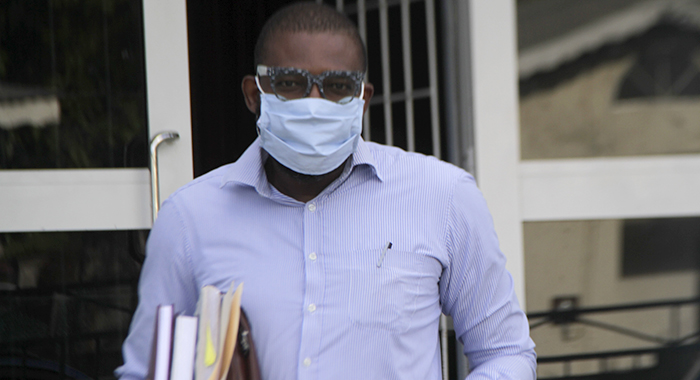
The prosecution told the court that as suggested, the court had taken the break so that Marks could present the authority if he had it.
The magistrate said that that was one of the arguments — that Nicole John’s statement be expunged from the record.
“Certainly he does not have any authority. The other reason was to make copies available to the other side,” Pompey said, noting that he had gone so far as to note that there were no copiers in the area and had asked if until 2 p.m. would have been enough time.
Marks told the court that he would deal with “later” the authority he is relying on for the exclusion of Mrs. John’s evidence as he did not have a copy “now”.
He said he also wanted to rely on the inherent jurisdiction of the magistrate to exclude any evidence that the magistrate deems to be unfair.
The magistrate ordered that disclosure be made and the prosecutor again told the court that he had called ahead to say he was running later.
The copies were given to the defence at 2:33 p.m.
The prosecutor said that the statement basically contained what Mrs John had stated earlier in her evidence.
“I haven’t even had an opportunity to read it yet, if I may—” said Daniel, who was looking at the document.
The trial was adjourned at 2:34 p.m. on Friday and resumed at 9:23 a.m. on Monday, 23 minutes later than scheduled.
After the legal arguments and the ruling by the Magistrate, Mrs John took the stand at 9:51 a.m. and her testimony ended at Witness stood down at 2 p.m., ollowing a break from 12:06 p.m. to 1:39 p.m. for the luncheon interval.




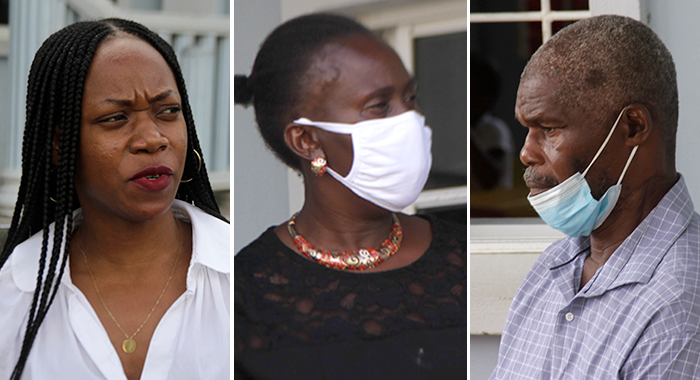


Kenton, Is the magistrate wearing a hoursehair wig? Horse hair wigs would suit Pompey and Daniel fine on the comedy stage of a trial taking place in Vincyland. Marks n Co including the magistrate are all in the same rap camp while Brette spitting lyrics trying to avoid a travesty. What’s needed now is a poet and some steel pan and drum music in the background for the narrative. Starting with, ♮♭Lard help C. John. ♫♫♫……what kind of shit is about to go down.♪♪..♪.♮ This is a no brainer…. for the bailiff ♫♬
Pure monkey motions… a farce